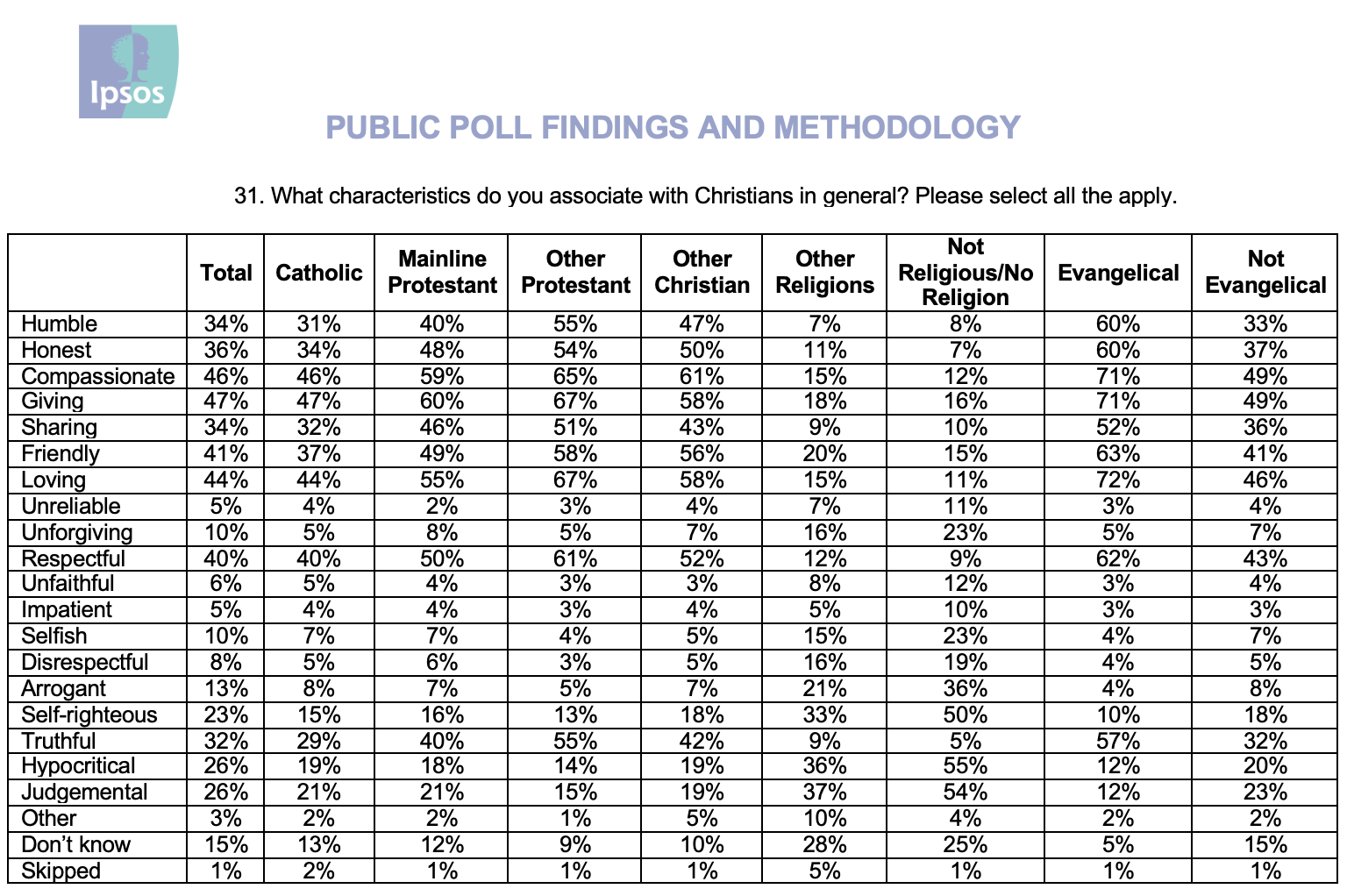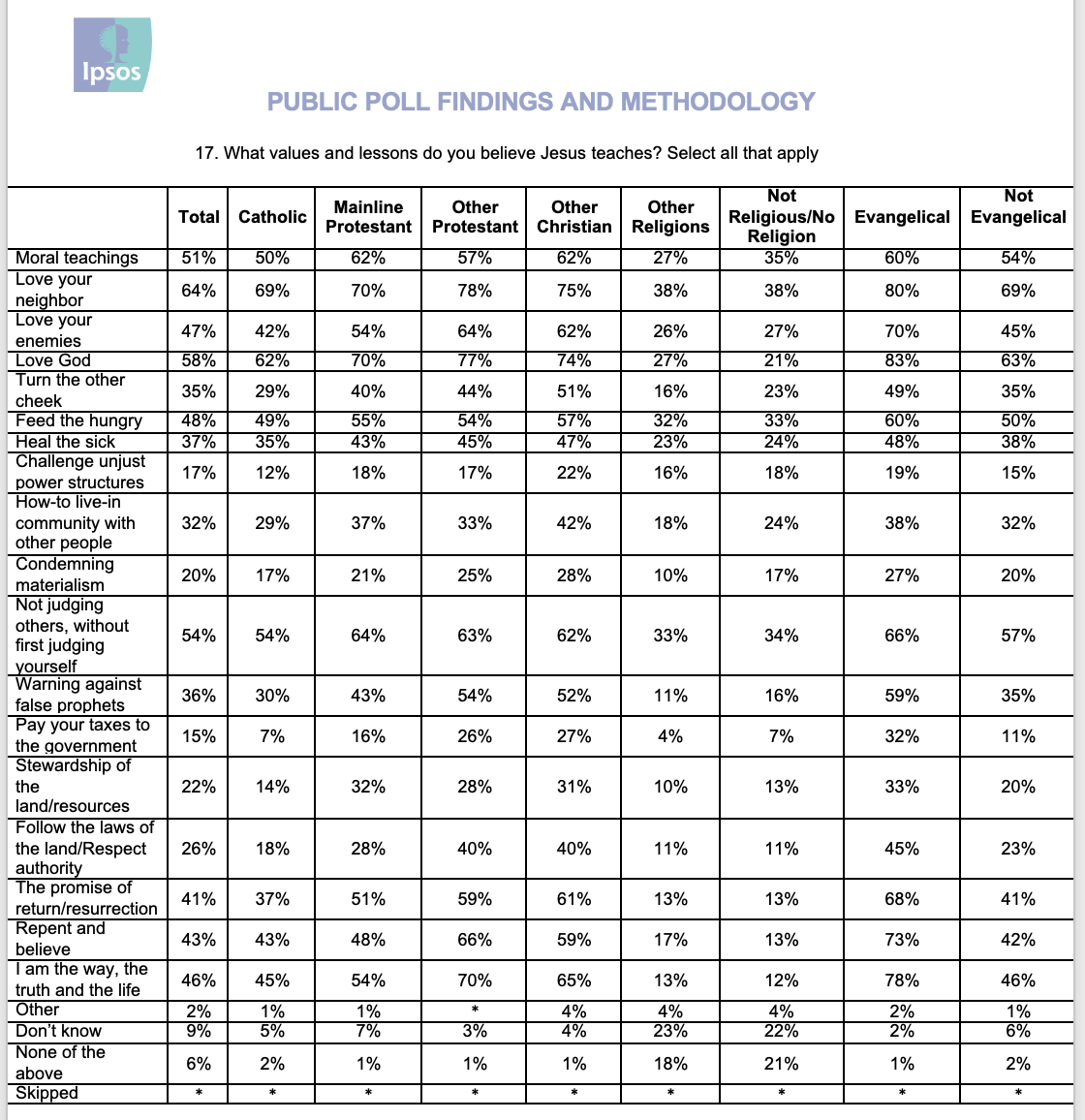(RNS) — Ask a Christian to explain different Christians and the solutions doubtless might be “giving,” “compassionate,” “loving” and “respectful.”
Ask a non-Christian, then again, and the extra doubtless descriptors you’ll get for Christians are “hypocritical,” “judgmental” and “self-righteous.”
Non-Christians are additionally much more more likely to say Christians don’t signify the teachings of Jesus.
These are the outcomes of a brand new survey performed by the Episcopal Church, launched Wednesday (March 9), that illustrates stark variations between how Christians and non-Christians view Christianity in the USA.
“There’s a disconnect between the fact of Jesus and the perceived actuality of Christians,” stated Bishop Michael Curry, presiding bishop of the Episcopal Church.
The Episcopal Church, one of many largest mainline Protestant denominations within the U.S., performed the survey of American adults with market analysis firm Ipsos partially to determine these gaps, in response to Curry.
The denomination additionally wished to open a dialog and dialogue, the presiding bishop stated. Christians must study to pay attention, he added.
“This was an try on our church’s half to truly hearken to what others have been saying about Jesus, about us. We dared to ask, ‘How are we perceived?’” Curry stated.
Researchers narrowed in on the disconnect between how Christians understand themselves and the way non-Christians or individuals with no spiritual affiliation see them.
Robust majorities of evangelical Protestants (71%), mainline Protestants (59%), different Protestants (65%) and different Christians (61%) stated they considered Christians general as compassionate, as did 46% of Catholics. Nevertheless, solely 15% of those that belong to different religions stated the identical, and the quantity was even decrease amongst individuals who declare no spiritual affiliation (12%).
 The ratio roughly flipped when respondents have been requested if Christians have been hypocritical: Most religiously unaffiliated People stated sure (55%), whereas 20% or much less of all Christian teams agreed. Evangelicals specifically have been the least doubtless (12%) to explain Christians as hypocritical.
The ratio roughly flipped when respondents have been requested if Christians have been hypocritical: Most religiously unaffiliated People stated sure (55%), whereas 20% or much less of all Christian teams agreed. Evangelicals specifically have been the least doubtless (12%) to explain Christians as hypocritical.
Curry identified that the query referred to Christians typically versus asking about particular subgroups, noting most individuals aren’t typically conscious of the variations between, say, evangelical and mainline Protestant Christians. Many non-Christians additionally is probably not conscious of the issues common Christians are doing, comparable to volunteering in soup kitchens or serving in different methods, he famous.
However, he admitted, “We received some historical past.”
“We as Christians must personal that — that fairly often, we’ve been silent within the midst of unspeakable horrors once we ought to have spoken up.”
Christians have an extended historical past of being on completely different sides of main ethical points, comparable to pastors who supported the establishment of slavery and Christian abolitionists who fought to finish it, he stated.
The presiding bishop additionally famous that, no matter their views on Christianity, 84% of respondents general noticed Jesus as an “essential religious determine.” That features 50% of religiously unaffiliated respondents.
“However they see the contradiction between (Jesus and) their understanding of what his followers are about, or what lots of his followers are about. And I believe we should shut the perceptual hole, each in actuality and in notion,” he stated.
 When requested how properly Christians signify the values and teachings of Jesus, many religiously unaffiliated respondents stated “by no means” (29%), whereas solely 2% stated Christians signify Jesus’ values and teachings “rather a lot.” The numbers have been a bit much less harsh amongst respondents of non-Christian religions, however nonetheless 18% stated “by no means” and simply 6% stated “rather a lot.”
When requested how properly Christians signify the values and teachings of Jesus, many religiously unaffiliated respondents stated “by no means” (29%), whereas solely 2% stated Christians signify Jesus’ values and teachings “rather a lot.” The numbers have been a bit much less harsh amongst respondents of non-Christian religions, however nonetheless 18% stated “by no means” and simply 6% stated “rather a lot.”
That suggestions was laborious to listen to, Curry stated. However, he added, “You may solely start the method of therapeutic, when you’ve gotten an correct prognosis.”
RELATED: Jon Meacham, Bishop Michael Curry talk about faith, politics and rebel
Closing the hole between individuals’s perceptions of Jesus and their perceptions of his followers will take a “new Reformation,” in response to Curry — one that features not solely “re-presenting” a Christianity that he believes appears to be like extra like Jesus to the remainder of the world, but additionally higher formation of Christians round Jesus’ teachings and lifestyle.
”The church has received much more to do, which is an effective factor,” he stated.
The survey confirmed most individuals consider Jesus taught to like God (58%) and love one’s neighbor (64%), which they ranked amongst his most essential teachings. Fewer consider he condemned materialism (20%), challenged unjust energy constructions (17%) or instructed individuals to pay taxes (15%).
 Christian respondents additionally have been requested what messages they believed have been most essential to obtain from spiritual establishments. The preferred reply (26% general, together with 45% of evangelicals and 22% of mainline Christians) was the message of Jesus as savior. Additional down the record have been messages like serving to others in want (13%) and pursuing God’s justice and peace (6%).
Christian respondents additionally have been requested what messages they believed have been most essential to obtain from spiritual establishments. The preferred reply (26% general, together with 45% of evangelicals and 22% of mainline Christians) was the message of Jesus as savior. Additional down the record have been messages like serving to others in want (13%) and pursuing God’s justice and peace (6%).
Curry recalled the phrases of a former parishioner, who stated that Christians love “Christmas Jesus” — the newborn they consider to be the Son of God whose beginning they have a good time at Christmastime.
“Christmas Jesus is nice. I like Christmas Jesus — however the child did develop up,” he stated.
“So let’s hearken to the Sermon on the Mount Jesus: ‘Love your enemies.’ Let’s discover what meaning.”
The Episcopal Church’s “Jesus in America” research surveyed 3,119 People adults in each English and Spanish between Nov. 22 and Dec. 2, 2021. The research has a margin of error of +/- 2.0 share factors on the 95% confidence degree, in response to the denomination.

